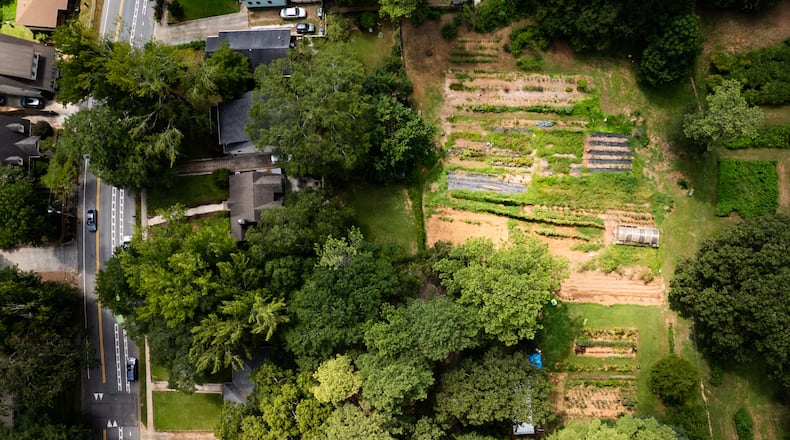Tucked away a few blocks from the Beltline’s under-construction Southside Trail, an unlikely five-acre urban farm in Atlanta’s Ormewood neighborhood defied the odds, delighting locals for over a decade. Now, the beloved property will bloom into the community’s newest city park.
When he pieced together the land in the late 1990s, owner Brian Harrison had no agricultural aspirations. But as rising property taxes strained his wallet, he needed a creative solution.
A beehive and vegetable farm allowed Harrison to register the green space as farmland, a move that both slashed his taxes and kick-started a beloved community tradition.
Harrison added rows of blueberry bushes for picking and later invited neighbors to lease garden plots. A man without any of his own children, he hosted an annual Easter Egg Hunt that consistently drew over 200 young attendees eager to race across the green grass in search of prizes.
Credit: Seeger Gray/AJC
Credit: Seeger Gray/AJC
The community Harrison created was taken aback when he unexpectedly died of a heart attack October 2022. He was 54.
In the immediate aftermath, some neighbors were unsure what would become of the urban oasis.
Two years later, thanks to advocacy from Brian’s family and neighbors and a pending $2.7 million purchase from the city of Atlanta, the property will live on as both a working farm and city park under a new name — “Red’s Farm Preserve” — a nod to the farmer’s fiery auburn mane that grayed over the years.
“I heard a kid recently say, ‘Oh, my parents knew Red back when his hair was red,” Harrison’s sister Susie Aquino laughed.
Credit: Alison Church / AJC Special
Credit: Alison Church / AJC Special
She remembers her brother as a man of many talents, an artist and free spirit who had a smile for everyone. Although Aquino, her father and her other brother all live in or around Ormewood, none of Harrison’s relatives have the same penchant for gardening. But the family says they deeply value the sacrifices Red made for his green space.
“He just wanted to share the land with the neighbors and keep it natural,” Aquino said. “We always appreciated his tenacity to hang on to the land and keep it from being developed.”
“We could have maximized a profit by selling the land to developers and filling it with McMansions or high-density condos, but we wanted to preserve Brian’s legacy by keeping it green for the community.”
Harrison’s dedication also drew in neighbors focused on maintaining the farm.
Several collaborated with Harrison’s relatives to form the Urban Farm in Ormewood Inc. (UFO), a group committed to Harrison’s mission. The nonprofit officially incorporated in April and finalized board membership this summer.
UFO Board Chair Sarah Corbett said top priorities include keeping the space as a community hub and restoring biodiversity. An Ormewood resident since 2019, Corbett immediately connected with Harrison’s vision when she moved into a home behind the property.
Credit: Seeger Gray / AJC
Credit: Seeger Gray / AJC
“I saw a trail in the backyard, through the woods, wandered up through there, up this hill, and came out to this beautiful, open green space with this huge field of flowers that was growing at the time,” Corbett said. “And I said that day to my partner that I don’t care what’s wrong with our house, this is where we’re moving.”
For the last two years, Corbett has grown flowers and herbs in her plot on the farm. She recently took up beekeeping after inheriting the equipment from the former owner.
Six to eight other people still cultivate gardens on the land. Corbett said one neighbor grows enough food to feed his whole family — buckets and buckets of beans, corn, tomatoes and pumpkins.
Both Corbett and Aquino said Harrison looked into conservation easements before his untimely passing, but struggled to organize the next steps.
“Even though he was so generous about letting people utilize the space, he had a really hard time asking for help,” Corbett said.
Yet Harrison’s stubbornness was arguably one of his greatest assets. A 2008 Atlanta Journal-Constitution article details the stress he faced in early farming years. Only half his first blueberry bushes survived. His bees got sick and died off. Twice.
Despite a dubious county appraiser, Harrison defended his farm status and managed to scrape by with donations.
When Harrison passed, Councilmember Jason Winston reached out to the family’s attorney, Eric Teusink, a conversation that led Winston to oversee City Council legislation for the purchase of Harrison’s land. Winston often visits the property with his own children, who love running through nature, picking blueberries and meeting their neighbors. He met Harrison several years ago, calling the farmer a “local legend” with a well-known Southeast Atlanta presence.
Credit: Seeger Gray / AJC
Credit: Seeger Gray / AJC
Aquino and other members of the Harrison family sold the farm to national nonprofit The Conservation Fund, which will officially convey the property to the city in coming months. From the councilman’s perspective, turning the farm into Ormewood’s first large green space continues Harrison’s legacy of community outreach.
“The city has been really intentional about looking at ways that we can expand our green space footprint across the city of Atlanta, and this gives us a unique opportunity to do that in a place that’s literally in the middle of the city,” Winston said. “I mean, it’s so serene that it just doesn’t feel like you’re in the middle of a major metropolitan city when you’re on this farm.”
Aside from some water infrastructure maintenance, the city will leave most decision making to the UFO Board and Harrison’s family.
They don’t want to change much.
Harrison’s beloved urban farm will keep its 20 chickens and buzzing beehive. The board hopes to add more fruit trees, along with expanded environmental educational workshops. And Aquino shared plans for a memorial: a sculpture by a local artist, crafted of granite from the creek, showing Harrison walking up one of the farm’s rolling hills.
About the Author
Keep Reading
The Latest
Featured







